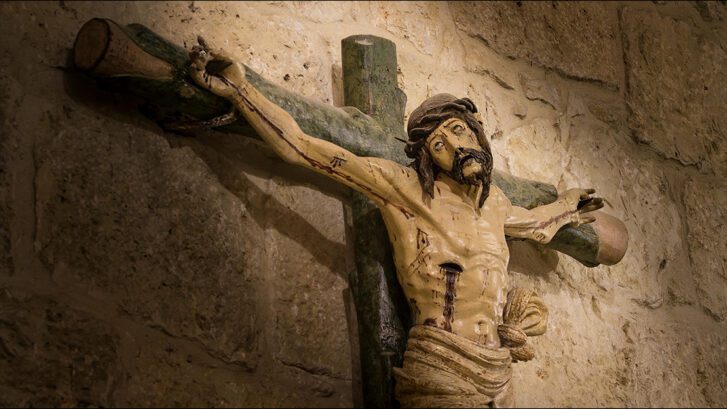Fr. Matthew Mary | April 4, 2025
The first reading today is taken from the famous words of the Book of Wisdom (2:1, 12-22) that bear an uncanny resemblance to the situation that unfolds between Our Lord and those who want to put him to death. The Book of Wisdom basically reveals the thought process of the wicked and their progression from disdain of the righteous man to torturing him and even going so far as to put him to death. We often find in reality that the wicked man is not as obvious as a supervillain from a comic book who is blatantly evil. Those who perform wicked deeds will usually attempt to cover over their sin with a façade of righteousness and piety so that their evildoing is not as obvious. However, a man whose heart is truly righteous is capable of piercing through the pious veneer of the wicked and calling out the evil that lies underneath.
As we know from the Gospels, Jesus does not mince words when he interacts with the scribes and Pharisees, and he chastises them for their neglect of God’s law. On the surface, these religious leaders dress in appropriate religious attire and bask in the glow of their honorific titles of “teacher,” “rabbi,” and “father.” Yet Jesus, who is perfectly righteous, easily recognizes their subterfuge and calls them out for their hypocrisy and their grave transgressions of the law. Instead of feeling convicted and remorseful for their harmful actions and turning to the Lord to seek forgiveness, mercy, and healing, they engage in the wicked thought process that is recounted in the Book of Wisdom today. In their pride, they despise Jesus for exposing their sin and they harden their hearts against the Lord. They do not engage in serious self-reflection, examination of conscience, and repentance but instead further compound their sin with the sin of conspiring against the Lord to put him to death. Rather than suffer embarrassment and shame for their sin, they are instead embarrassed that their sin has been exposed to the public. Thus, they reject righteousness altogether and seek to kill the Lord of life. In their arrogance, they think that by slaughtering the innocent man, they will put an end to the inconvenience that he poses to them. In this way, they emulate the murderous action of Cain, who is moved by envy to slaughter his brother Abel.
“Instead of feeling convicted and remorseful for their harmful actions and turning to the Lord to seek forgiveness, mercy, and healing, they engage in the wicked thought process that is recounted in the Book of Wisdom today. In their pride, they despise Jesus for exposing their sin and they harden their hearts against the Lord.”
Yet, as the Book of Wisdom says, their wickedness blinded them as they “knew not the hidden counsels of God.” They knew nothing of the “innocent souls’ reward.” Thus, in condemning Jesus Christ and by putting to death the Lord of Life, they have only released a fountain of everlasting mercy that springs from the wounded heart of Jesus. Although they have condemned the Righteous One, the Lord does not condemn them in return. He does not return evil for evil or a curse for a curse. Instead, Our Lord pleads from the Cross on behalf of those who crucified him, begging His Father to forgive them, for they know not what they do. It is not condemnation that flows from the Sacred Heart of Jesus, but compassion and mercy. By rejecting this fountain of love and mercy, the wicked only condemn themselves, for there is nothing more that Love Himself can do to show the depths of his love for humanity.
Today’s meditation on the thoughts of the wicked can be enlightening for us if we bring it to our own personal prayer. Most of us tend to think of ourselves as people who are basically good and who would never think of doing something as evil as seek the death of another person. However, we would be foolish to dismiss the enticing power of the Evil One and how easily our minds can be deceived. Perhaps we can examine ourselves while considering the thoughts of the wicked as they are presented in the Book of Wisdom. Do we get angry with good people who correct our words and our behavior? When we receive just correction from others, do we snap back with a prideful response? Do we mock and try to tear down people who are genuinely holy and who usually seek to do what is right and just? Do we find ourselves wishing harm on another person, simply because we think they are a nuisance? If we find that our thoughts match up with the thoughts of the wicked, then it is never too late during this earthly life to repent. The Lord is patient and merciful and does not condemn the sinner who repents and who strives to make reparation for their sins.
During this penitential season of Lent, we are drawn into the mystery of Christ’s fasting in the desert. This is a time of more intense examination of conscience, detachment from worldly goods and selfish ambitions, turning away from ideological thinking, and repenting of our sins. The sacrament of penance is a wonderful way to prepare ourselves for the upcoming Easter Triduum. Then, as we enter Holy Week and reflect upon the amazing work of redemption that Christ has done for us, we hope to find ourselves, not among those who called for the Crucifixion of Christ and who persevered in their rejection of Christ, but among the disciples who rejoiced at the Lord’s Resurrection. By our union with Christ, we wish to be among those who receive the innocent souls’ reward as we share in Christ’s Resurrection to eternal life.


